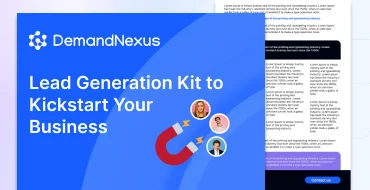Let’s take seven actionable strategies here in this guide to shorten the sales cycle and close the deals quickly without worrying about the quality of leads.
Know the Sales Process
Knowing the basics of a typical B2B sales process would be important before diving into ways on how to shorten your sales cycle. The proper understanding, indeed, can set strategic adjustments in the brain of the sales team for it to actually speed up the whole process.
What is a B2B sales process?
- A B2B sales process is the pre-defined process through which a product or a service is sold to another business. This would include marketing efforts aimed at generating and maintaining the interest and direct sales tactics by engaging with leads, qualifying them, and, most importantly, potentially turning them into customers.
- Because the buying process greatly differs from one industry to another and from one target market to another, it’s also very important that the sales strategy be used within your own particular context. A lot of closeness has to happen between sales teams and marketing teams so that the lead does not get lost when handed directly from a marketing activity into a conversion.
B2B sales process stages
- Prospecting – Identifying potential leads.
- Qualifying Leads – Finding out their budget, authority, need, and timeline.
- Needs Analysis – Understand what the prospect is pained by and what he needs to do.
- Presentation – Show him what you offer.
- Handling Objections – Address objections, negotiate terms.
- Closing – Have him commit for final.
- Follow-Up – After Sales cycles
Average sales cycle formula
To find your average sales cycle, use this simple formula:
Average Sales Cycle= Total Days Taken to Close Deals/Number of Deals Closed in that Period
It tells you with data insights how long, in general, your team takes to close the deal, which will help you understand the patterns better for where there is a time bottleneck.
Shorten Sales Cycles

Now that you have an idea of what the average B2B sales cycle is like, let’s talk about some strategies that can shorten this process. Implementing these will get sales and marketing teams working more effectively, close deals sooner, and generate higher revenues.
Automate repetitive tasks
Probably the biggest time sink for a sales representative is the manual, repetitive tasks. Automate them so that your team can work on real relationship building and closing deals. Start with an audit of your sales process to identify automatable tasks and include:
Company Research: Automate data gathering to save hours spent researching potential leads.
Data Entry: Use tools within the CRM system to automate entry to track the lead in a more efficient manner.
By automating these low-value tasks, sales reps can dedicate their energies to high-probability activities that have a direct relationship with the closing of deals.
Focus on high-performing channels
Don’t throw away the precious time that your team has by spending it on channels that are returning nothing for you. Focus on the most valuable channels where you are getting the most effective leads from both sales and marketing.
Track performance metrics so you understand which channels and strategies drive consistently engaged leads. With data behind your channel adjustments, you’ll be able to cut the length of your sales cycle dramatically while avoiding lost deals.
Good communication and people relationship
The acceleration of the decision-making process can be boosted through authentic relationships with potential leads. The prospect will confidently make a choice by clearly communicating the price and value in the first place.
- People don’t like finding out about unexpected costs and fees in the eleventh hour.
- Make it crystal clear what a prospect will get from your service and pricing transparency gives prospects a reason to trust you.
- Avoid strategically doling out added costs or fees, which is difficult and time-consuming to explain later.
Create a Unique Customer Experience for Each Prospect
- Personalization makes prospects feel valued. Use information gathered during the discovery call to tailor future conversations. For example, you can directly have a conversation on the specific pain points and then position your product as something right for those problems. Personalization increases the chances of closing deals quickly because it shows you genuinely understand the prospect’s business.
- In addition to building the relationships, improving the logistics of sales interactions can also contribute to shortening the sales cycle.
Make it easy for prospects to sign contracts
- Prospects appreciate smooth processes. Offer online contracts that can be completed from anywhere: any device, at any time.
- That eliminates unnecessary back-and-forth and decreases friction within closing. For instance, instant access to documents speeds up closings.
Use incremental closes and mutual action plans
And instead of waiting till the end, try incremental closing itself. A small agreement such as agreeing to another meeting or requesting a case study is a short series of incremental closes that make up part of the well-guided journey a prospect should take to a final “yes”.
A MAP will also keep you both, as well as your prospect, aligned on next steps. This roadmap outlines exactly every single thing that each party has to do. Make the sales process run all the smoother and shorten that dreaded sales cycle by arming your sales reps with the proper tools and coaching to better engage prospects.
With these factors in your sales strategy and tools in place, not only will the length of your sales cycle shorten dramatically, but the overall length of the sales process itself can be shortened also.
Sales Enablement and Coaching for Sales Reps
Implement a discovery-focused sales methodology
Once your salespeople understand a structured sales process, such as the Sandler System, they will qualify those leads so much faster.
Putting more emphasis on discovery and understanding the buyer’s decision-making process early in the sales process allows the salesperson to position themselves within the needs of the buying committee to fit their methodology.
Leverage social proof and case studies
Social proof is an excellent way to deal with long sales cycles. Utilize case studies or testimonials by similar companies to create trust.
Showing how your solution has helped others solve similar challenges reduces the perceived risk and helps convince key stakeholders to sign off much faster.
Measuring and Optimizing Sales Performance
Regularly clean your CRM to eliminate cold contacts
An up-to-date CRM is important for keeping track of active, engaged prospects. Dropping cold or uninterested leads ensures that your team spends quality time working with leads, which most likely convert.
Segment your contacts by interest and engagement levels to ensure that your sales team spends their precious time using it aptly.
Analyze and optimize sales metrics
Monitoring of your key performance sales indicators, for instance, lead conversion rates, time per deal, and closed deals help keep track of exactly where you need improvement. Using data-driven insight to refine your strategy cuts the entire sales cycle.

Download this Monthly KPI Tracker Sheet ➜


